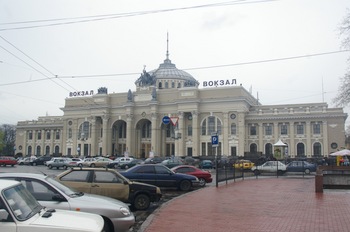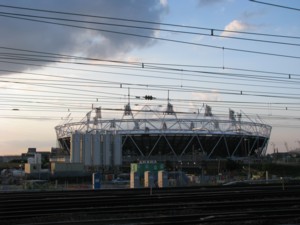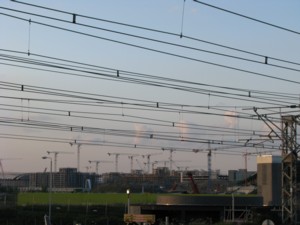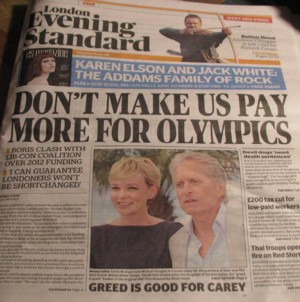We are developing the social individualist meta-context for the future. From the very serious to the extremely frivolous... lets see what is on the mind of the Samizdata people.
Samizdata, derived from Samizdat /n. - a system of clandestine publication of banned literature in the USSR [Russ.,= self-publishing house]
|
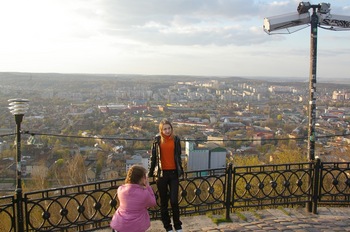
The Julie Delpy lookalike in the High Castle. Lviv, Ukraine. April 2010 On April 21 this year, I was in Odessa, on the Ukrainian Black Sea coast. I was booked on a scheduled Ryanair flight from Katowice in Poland the following evening at 8.25pm. No flights had flown out of Poland or into England for a week, but I had suddenly been informed that I had 27 hours in which to get at Katowice airport.
I have written a lengthy piece about this journey, giving history, sundry political and economic observations, and a description of just how I came to be in Odessa on April 21. Unfortunately, this blog post somehow managed to come to over six and a half thousand words, which is perhaps excessive.
Therefore, I have done some editing. The introduction to the post that gives all the background is on my own blog here. On Samizdata, I will post from the point where the action starts.
The first step was to get from the Black Sea coast to the Polish border. There was a train departing Odessa for Lviv at 7.00pm. I purchased a ticket. → Continue reading: Smoked fish thrust at me after midnight, and cigarette smuggling in the snow.
When a party loses power after an election it is traditional for departing ministers to leave personal notes to their successors, usually consisting of advice on how to do the job. In a rare and beautiful display of political honesty, the departing Chief Secretary to the Treasury, Liam Byrne, wrote the following to David Laws, the Liberal Democrat who is taking over:
“Dear chief secretary, I’m afraid there is no money. Kind regards – and good luck! Liam.”
This almost reached the sublime level of the parting message of Reginald Maudling to the new Chancellor James Callaghan in 1964: “Good luck, old cock … Sorry to leave it in such a mess.”
As recounted here in a justifiably passionate editorial about the European Union’s plans to beat up the City of London, we are reminded that, whatever the vote might have been in the May general election, that with qualified majority voting in the EU, states can – and do – gang up to put a particular country’s economic affairs in grave difficulty.
Paris and Frankfurt have, in particular, resented the prosperity of the City. And as the recent travails of the euro show, there is precious little to be said for the supposedly wiser governnance of the euro zone. There was a certain amount of gloating after the US and UK got hit by the sub-prime mortgage meltdown (some of that gloating might have been justified) but it is quite clear that the rigidities of the euro zone remain a severe problem.
Why we are in the EU again?
Many of the relatively new Docklands Light Railway stations I’ve passed through, often being situated on old or new viaducts, or part of similarly elevated main line stations, have offered fine views of the eastern parts of London, which is where many of the big towers are. Yesterday afternoon I took my camera with me in search of more such stations with views. I was not disappointed, and the weather, not good of late, was also on my side.
Pretty much by chance, I found myself at this station:
From this quaintly named viewpoint, I saw what I at first thought was some kind of football stadium. But, it seemed not to be finished. What could it be?
Also, other building was going on not too far away, by London standards. I love a good crane cluster:
But what was it all? Then I saw a weird object looking like a giant deep sea fish. This could only mean one thing: an unpopular sport of the kind that Needs Government Help. This wasn’t football. Of course! This is where the Olympic Games are going to happen:
All those wires in the sky are because regular trains go past this station, although they don’t stop there.
Here’s another picture, relevant to those above, this time of the front page of the London Evening Standard from last Friday:
By us, Mayor Boris means me and my fellow Londoners. Here is the story.
I cursed the day that London got these damn games on the day it got them. It looks like all other London taxpayers will soon be doing the same. And I will be very surprised if all other UK taxpayers don’t end up agreeing, despite what that “Culture Minister” says.
The “GREED IS GOOD” thing concerns Michael Douglas, pictured in the picture, reprising Gordon Gekko. I dare say we will soon all learn that the entire recent economic meltdown was Gekko’s fault. Nothing to do with crazy government monetary policy. But banking, like the Olympic Games, is a nationalised industry, and each is as economically out of control as the other.
History and ordinary prudence dictated that the union might be broad and shallow (a free-trade area, with embellishments, capable of taking in all-comers) or else narrow and deep (an evolving political union, confined to countries willing to be led there). Of the two, I always believed that the first was better. But the architects did not even have the brains to choose the second. They recognized no limits to their ambitions. They set about creating a union that was both broad and deep. A federal constitution, a parliament, a powerful central executive, one central bank, one currency – all with no binding sense of European identity. As for scale, well, the bigger the better. Today Greece, tomorrow Turkey. And why stop there? Madness.
– Clive Crook ponders the excessive ambitions behind the EUropean project.
Michael Jennings is probably too classy to rave about this here (although I have been checking just to be sure), so I will do it for him. Well, let the man from Cricinfo.com do the raving for the both of us:
Saeed Ajmal to MEK Hussey, SIX, Australianism prevails! What a great dramatic game this has been. Goose bumps! Michael Hussey has played like a dream. Whaddaplaayaaaa! He finished the game with yet another big hit. This is the Twenty20 innings of his lifetime. He finished it in style. He cleared the front foot and swing the ball over long-on. The while ball disappeared beyond the boundary. The Australian dug out erupted in joy. The Pakistani camp is stunned. U N B E L I E V A B L E. Hussey is mobbed by his team-mates. Clarke envelops him with a hug. The entire squad is out there on the ground.
Paskistan recently toured Australia, and I think (Michael J will know) that they lost every game they played, with varying degrees of embarrassment ranging from quite a lot to total. After the tour, their selectors banned various major players for misconduct. It was the tour from hell. There was no way they were not going to be obliterated by the Aussies in this game. Come to that, how the hell did they get to this semi-final in the first place? Yet as the game turned out, they will be gutted to have lost it. At no point during this entire contest other than during the last three or four balls of it, did Australia look like being within a mile of winning, yet thanks to another Aussie Michael, Michael Hussey, who hit 60 in 24 balls, including six sixes (three of them off the last four balls of the game), they did win, and what is more, with an entire ball to spare.
Sunday, it’s Australia v England in the final, of the Twenty Twenty world cup or championship or whatever it is in the West Indies. After they had this scare, you would bet even less against Australia winning the final than you would have done anyway. I don’t see Australia getting ambushed by England now, even though England have played out of their skins throughout this tournament. England’s best chance was always going to be if the Pakistanis beat the Aussies by playing out of their skins (which they did – right up until the bit when they lost) and then partied so hard that they failed to show up for the final.
But then again, as this game demonstrates, in T20, nothing is impossible.
And especially not if you are Australian. Now the Cricinfo man is quoting the late John Arlott:
“Australianism,” wrote Arlott, “means single-minded determination to win – to win within the laws but, if necessary, to the last limit within them. It means where the ‘impossible’ is within the realm of what the human body can do, there are Australians who believe that they can do it – and who have succeeded often enough to make us wonder if anything is impossible to them. It means they have never lost a match – particularly a Test match – until the last run is scored or their last wicket down.”
Indeed. Good luck England on Sunday. They’ll need it.
A bit later: slightly calmer Cricinfo match report here. Which I will now go and read.
And a bit later than that: incoming email from Michael J. Nothing in it. Title: “YEEEEEAAAAAHHHHHH!!!!!!” Copying and pasting of email titles doesn’t work with me, so can’t swear to the exact spelling there.
My good friend Stateside, Russell E Whitaker, is, like an increasing number of Facebook users, getting annoyed at how any privacy settings that might seem to be available on the service are not being respected and have in fact been eroded, according to this report. Now, I have always taken the view that the internet is not a fully robust thing from a privacy point of view, but then again, if a business claims to respect privacy, but it turns out there is a problem, then users are entitled to feel angry.
I have a FB page, but I never put sensitive personal stuff on there and I tend to prune so-called “friends” pretty ruthlessly if I find that anyone is taking liberties with me. But I take the risk, at least for the moment.
But the beauty of this technology and indeed of capitalism is that complaints about an issue – such as privacy – are already spawning new ventures and ideas. I am not sure how this venture will work out (based in NY) but I wish it the best of luck.
“Yes, we might all think that sending a virtual red rose over Facebook is silly but those sending them (and presumably to some extent those receiving them) do value them. And that value is what we measure when we talk about GDP and it is the creation of that value that allows people to make profits. There is absolutely nothing at all in the capitalist system, the free market one (these are two different things please note), the pursuit of profits or even continued economic growth that requires either the use of more limited physical resources or even the use of any non-renewable resource.”
Tim Worstall, nicely skewering the idea that economic growth is the same as ever rising consumption of finite resources. Not the same thing at all.
Well, for all you gold bugs out there, here is a spiffy new banking facility, although it so far is confined to the Gulf.
Ayn Rand and Ludwig von Mises would have approved, I’m sure. By the way, the price of gold is currently around $1,250, a new record. Given the various “quantitative easing” programmes of central banks in recent months, the hunger for the yellow metal is not surprising. I must say that at current levels, it does seem a pretty risky idea to push even more money into gold, since there has been so much of a rally already. If – and this is one hell of an if – some governments start to reduce their debt burdens and try to squeeze monetary growth in some parts of the world (like in Australia), then some of that “fear premium” in gold may start to fade.
Sam Bowman, whom I mentioned in my previous posting below about the IEA, responded by emailing me further proof that he is taking his Cobden Centre duties seriously:
The Cobden Centre Education Network is a new network of students in the UK interested in libertarian and classical liberal economics, especially the Austrian school. Working with the Cobden Centre it aims to connect libertarian and classical liberal students across the UK and help them develop their interests and involvement in classical liberalism and libertarianism.
This summer, the Cobden Centre Education Network will be hosting a series of seminars studying Murray Rothbard’s Man, Economy and State, a seminal work in Austrian economics that lays the foundation for further study of the Austrian school. The seminars will take place twice a month at the Institute for Economic Affairs in London, and Cobden Centre board members and fellows will join us for some sessions. Electronic copies of all reading materials and a study guide will be provided.
As well as being a unique opportunity to develop a comprehensive knowledge of the Austrian school, this will give Education Network members a chance to meet some of Britain’s foremost libertarian and classical liberal thinkers.
If you are interested in joining the Cobden Centre Education Network, please email Sam (sam @ cobden centre (all one word) dot org – I trust that will deter at least some spammers – BM) with your name, contact email address, and university and course if you are currently in education. Please also state if you are available to attend events during the summer in London.
Outstanding. And good on the IEA for lending them the place to do this.
Badgering politicians is worth a go, because you can get lucky, and because even if they don’t listen, someone else might, especially in an age when letters can double up as internet postings. But politicians will mostly just do their thing, which is fire fighting the fires on their desks within the limits set by public opinion, or by what they suppose to be public opinion, and within the limits that they all set amongst themselves. What matters is the long-term intellectual struggle, that is, the process of creating the limits within which politicians and other decision makers will operate in the future. The above enterprise is a fine example of how you go about doing that.
In the age of social media, blogs, emails and so on, it is tempting to suppose that personal contact is a bit superfluous. But I suspect that the most lasting impact of such novelties is creating and strengthening old fashioned face-to-face contacts, between people who might otherwise never have been introduced.
I wonder if there is an upper age limit.
The Institute of Economic Affairs is the mothership of the free market think tanks, certainly in Europe. Or, it was. Because now, the IEA’s reputation is almost entirely based on the stir that it managed to make when it was presided over by the stellar duopoly that was Ralph Harris and Arthur Seldon. Those two men ensured that the classical liberal intellectual tradition remained alive in Britain, and they brought it, and the developing tradition of Austrian school economics, to bear on the failed Keynesian consensus of the 1960s and 1970s, laying the intellectual foundations for the Thatcherite economic rescue act of the 1980s.
Harris and Seldon had always been very careful, first, to ground their activities in pro freedom scholarship. The intellectual war was what they cared about most. Seldon fought that war. Harris, although also a considerable warrior himself, concentrated on making sure that the war effort was paid for. Second, they were careful not to get too closely intertwined with the Conservative Party, to the exclusion of any others. They always kept their lines open to anyone who was willing to listen to what they had to say and to help them say it, of any party or of none.
However, when age inevitably caught up with Harris and Seldon, the IEA then chose a man called Graham Mather as its new boss, who proceeded to use the place as his personal campaign office to turn himself into a Conservative MEP, while declaring that “the intellectual arguments have been won”. Mather was hurriedly dumped, and under John Blundell’s leadership the IEA then did rather better, even if it never really lit up the landscape like it had in the old days. To switch metaphors from fireworks to aviation, under Mather, the IEA was crashing earthwards and was about to burn up completely. Under Blundell it glided near horizontally, not at all disastrously, but without any upward impetus that I could see. When I heard that the Institute of Economic Affairs had, however long ago it was, appointed as their new boss Mark Littlewood, whose previous job was as a media relations person for the LibDems, I reacted with indifference. I hardly, that is to say, reacted at all.
Mark Littlewood has clearly always understood what classical liberalism and libertarianism are all about, and has done as much of them as he could, given the day jobs he has had. He has always been a friendly and civilised presence, albeit rather too EUrophile for my liking, at the various Libertarian Alliance events I have seen him at over the years, at quite a few of which he has spoken. Nevertheless, I assumed that in hiring such a person, the IEA was merely going to throw a big chunk of its still impressive stash of money at a pointless media-based charm offensive, which would achieve nothing. Pick a nice chap, with lots of contacts in politics and in what they used to call Fleet Street, hope for the best and get nothing very much. After a few years, Littlewood would move on. In due course, the building would be sold and the IEA would move from Westminster to somewhere or to nowhere. Its few surviving supporters would become even more geriatric. Another member of the Political Class, more unscrupulous than Mark Littlewood and cut from the same cloth as Graham Mather, would move in and hoover up all the remaining money, and that would be that. Way of the world. Old order giving place to new. Such is life. Such is death.
I never really thought any of this through, apart from the Mather episode, when I became tangentially involved as a junior advocate for the team that ousted him. I merely realise, now, that the above sentiments about Littlewood were what I was thinking, insofar as I was thinking anything at all. The point being that as far as the IEA was concerned, and like many others, I had pretty much stopped thinking.
So it was that when I got invited to a Libertarian Alliance dinner about a fortnight ago, at which Mark Littlewood was to speak about how he was setting about his various IEA tasks, I did not, as they say, jump at the invitation. I merely, having nothing else fixed, said yes and went along, expecting little more than some nice food. But as soon as Mark Littlewood started talking, I realised that I had been seriously misjudging him. → Continue reading: Mark Littlewood and the future of the Institute of Economic Affairs
This sounds like the kind of thing that our own Michael Jennings is fond of saying:
“I was recently waiting for a flight in Delhi, when I overheard a conversation between a Spanish UN peacekeeper and an Indian soldier. The Indian spoke no Spanish; the Spaniard spoke no Punjabi. Yet they understood one another easily. The language they spoke was a highly simplified form of English, without grammar or structure, but perfectly comprehensible, to them and to me. Only now do I realise that they were speaking “Globish”, the newest and most widely spoken language in the world.”
That’s journalist Ben Macintyre, quoted by Robert McCrum, in a recent Guardian piece about the global evolution of the English language. But, McCrum then asks, will English, having spread so widely, and like Latin before it, then fragment into distinct languages? Or will the effect of what is loosely called globalisation mean that enough English speakers who start with their local variant of English will want then to move towards a more internationally tradeable, so to speak, version of English, and make the effort? Will they try to add some of that grammar and structure that Ben Macintyre spoke of? And will global standard English, particularly as spoken by the more globe-trotting sort of American and in due course by most Anglos, itself hold out its hand, as it were, making its own effort, and come half way to meet Globish, to ensure that English, although changing faster than ever before, nevertheless remains one language, or at least one linguistic continuum? Will English, in other words, keep on pulling itself together? Note that Ben Macintyre had no problem understanding the Globish that he heard in Delhi, and would presumably have no problem speaking like that.
My guess is that there are powerful unifying forces at work here, as well as fragmenting forces. What follows began life as a separate posting, and was mostly written before I encountered the above article. → Continue reading: Bangalore changing to Bengaluru says that English will keep on pulling itself together
|
Who Are We? The Samizdata people are a bunch of sinister and heavily armed globalist illuminati who seek to infect the entire world with the values of personal liberty and several property. Amongst our many crimes is a sense of humour and the intermittent use of British spelling.
We are also a varied group made up of social individualists, classical liberals, whigs, libertarians, extropians, futurists, ‘Porcupines’, Karl Popper fetishists, recovering neo-conservatives, crazed Ayn Rand worshipers, over-caffeinated Virginia Postrel devotees, witty Frédéric Bastiat wannabes, cypherpunks, minarchists, kritarchists and wild-eyed anarcho-capitalists from Britain, North America, Australia and Europe.
|


